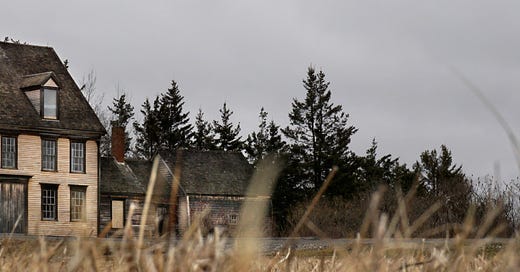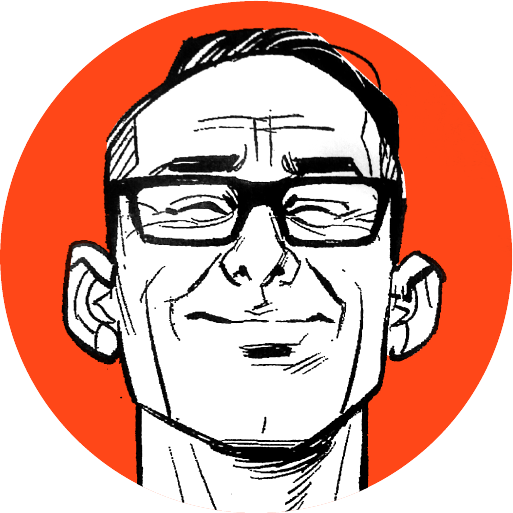First let’s start with a story about Suzy Vitello…
When Suzy was a student of Tom Spanbauer’s, she got married. She and Duane got hitched at “the farm,” a Victorian homestead they were renting. As a wedding present, I took them a huge bag of daffodil bulbs. It was that kind of a hippy-dippy place, the last real farm in an explosion of McMansions. The toilets froze over in the winter.
Which brings us to a story she wrote. Just a made-up story about someone whose septic drain field failed, and the chaos that created. And within a week, the actual drain field at the farm—it failed. That was always happening in Tom’s workshop. People would bring in the most outlandish stories, and in short order they’d eventually become reality. Tom called it “the woo-woo,” this way a well-articulated story could anticipate or manifest an event.
And maybe Suzy had some unrealized inkling that the toilets were about to back up, but this kind of event was too common to ignore. Once on the island of Capri I was walking with a group that included Martin Amis and his wife, Isabel Fonseca. She’d written an excellent book on gypsies, and as we walked to dinner through the narrow streets she described how gypsy fortune tellers were the psychologists and mental-health professionals of their culture. They could read the physical “tells” of a client, and ask questions that evoked things the client wasn’t aware of about himself. They weren’t so much predicting the future as they were recognizing things most people aren’t trained to see.
So maybe the prescience of writers is just that: paying very close attention. And a skill so ingrained that the writer or the fortune teller does it without a full awareness of doing so. Or there’s this, from the novel Theater1 by W. Somerset Maugham:
“She often felt that her talent, genius the critics called it, but that was a very grand word, her gift, if you like, was not really herself, not even part of her, but something outside that used her, Julia Lambert the woman, in order to express itself. It was a strange immaterial personality that seemed to descend upon her and it did things through her that she did not know she was capable of doing. She was an ordinary, prettyish, ageing woman. Her gift had neither age nor form. It was a spirit that played on her body as a violinist plays on his violin.”
Or as Lewis Hyde puts it in The Gift:
“The Romans called a person’s tutelar spirit his genius. In Greece it was called a daemon. Ancient authors tell us that Socrates, for example, had a daemon who would speak up when he was about to do something that did not accord with his true nature. It was believed that each man had his idios daemon, his personal spirit which could be cultivated and developed… if a man cultivated his genius through such sacrifice, it would become a lar, a protective household god, when he died. But if a man ignored his genius, it became a larva or lemur when he died, a troublesome, restless spook that preys on the living. The genius or daemon comes to us at birth. It carries with it the fullness of our undeveloped powers. These it offers to us as we grow, and we choose whether or not to accept, which means we choose whether or not to labor in its service.”
So whether a culture calls it a genius or jinn or Clarence the guardian angel who just wants to get his wings, people have held this belief across cultures. That something, some muse, is waiting to guide us if we’re ready and willing to devote ourselves.
Personally, when the writing goes well, it does itself. I’m just along for the ride, and the work seems to make its own choices. As Hyde quotes the poet Paul Goodman:
“I have recently written a few good poems. But I have no feeling that I wrote them.”
In watching writers develop, it never seems gradual. Someone in workshop slugs away for months or years writing mundane stuff, then—blam—they bring in something that seems written by a stranger. A bright stranger, sometimes a brilliant stranger, but hardly the writer herself. That was always cause for celebration in Tom’s workshop, a break-through piece. After that, the writer would never slide back into mediocrity. That’s also what Tom called “the woo-woo.”
A Stephen King essay I once read likened writing to archeology, and suggested that what a writer is doing is digging up something ancient and trying to keep as much of that thing intact as possible. The longer I write the more I agree with that theory. I don’t so much believe writers invent things as much as we make the invisible visible. These things already exist, and writers merely call our attention to them. Things modern or ancient or whatever.
Years ago I told a friend that I planned to write a story in which a bored, disgruntled movie projectionist splices single frames of porn into family films. Every projectionist I’d ever met had his stash of smutty frames he’d swiped from various prints. It seemed a small step from having them to splicing them in. My friend was horrified and said, “Don’t do that, because then people will start to do that shit.” He said, “You’ll just be making the world a worse place.” I wrote it anyway.
Since 1996, strangers have approached me and told me how they’d done such splicing long before I published Fight Club. So, again, I don’t think writers predict things. Suzy probably unconsciously noted how the drains had gotten slow. Or she’d smelled something foul in the yard. Our stories can manifest like dreams, calling our attention to fears we can’t openly acknowledge. Once the fear is outed, we deal with it or grow bored with it. Whichever the case, the fear goes away.
To me the stranger woo-woo, the real woo-woo is the breakthrough story that jumps a writer from being “a reader who tries to write” to a full-fledged “writer” with her own voice and who will take fiction in her own direction.
And only practice can do that. Practice and failing. And then giving up, and then experimenting and more practice. The woo-woo occurs when the writing seems to come from something beyond you. Whether that something is your muse or guardian angel, or your fully internalized skill set, who knows? When that something takes over it no longer matters whether or not your work will sell or be read. The doing of it, the writing becomes a vacation to another planet.
A friend of mine has bought a bar. She’s offered a night when writers can present their work and “road test” it. Most likely this will be a Tuesday night. In my experience nothing proves work better than the reaction of a live audience. If that interests you, please let me know in the Comments.
The novel was made into an Annette Bening film Being Julia, and it’s one instance where the book does best what books do, and the film does best what films do. Both are worth the effort to read/watch and compare. In particular is the long monologue at the end, which must be summarized in prose but can be dramatized to better effect in the movie.








“Someone in workshop slugs away for months or years writing mundane stuff, then — blam — they bring in something that seems written by a stranger….After that, the writer would never slide back into mediocrity.”
l’m going to keep this 👆in my pocket while I keep practicing. ✍️🙂
Interestingly enough, I’m here in Portugal visiting my mother and a couple minutes ago (literally) just before reading this substack entry, I awoke to my husband and my mother discussing the sewer gas stench that’s common in the area. I’m taking notes. I’m thinking a cozy mystery in the Algarve. An 80-yr-old crime solver (aka my mom) busting a murderer who hides their victims under the neighborhood toilets.